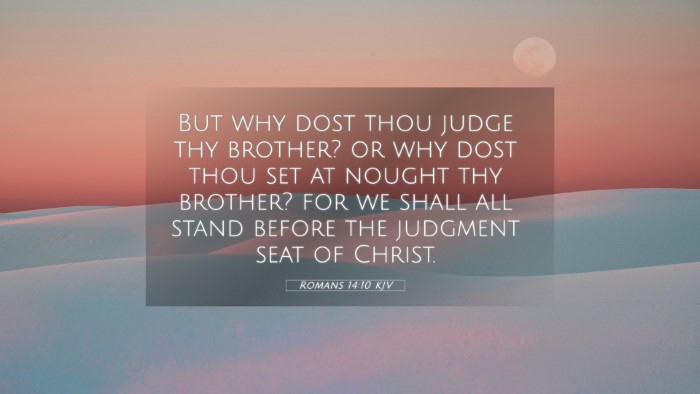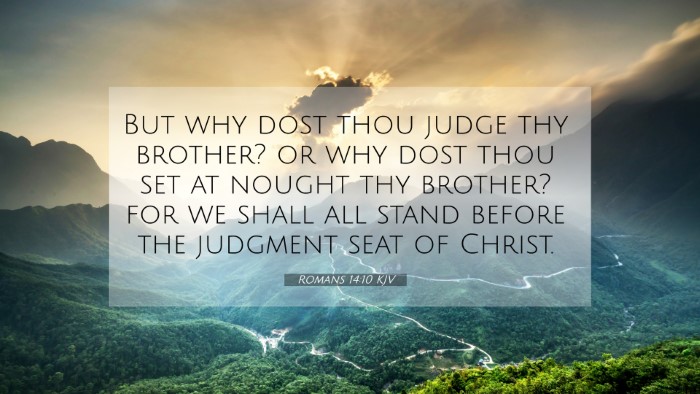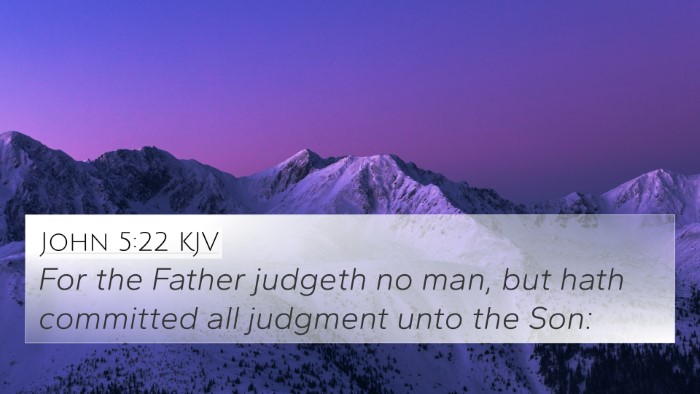Old Testament
Genesis Exodus Leviticus Numbers Deuteronomy Joshua Judges Ruth 1 Samuel 2 Samuel 1 Kings 2 Kings 1 Chronicles 2 Chronicles Ezra Nehemiah Esther Job Psalms Proverbs Ecclesiastes Song of Solomon Isaiah Jeremiah Lamentations Ezekiel Daniel Hosea Joel Amos Obadiah Jonah Micah Nahum Habakkuk Zephaniah Haggai Zechariah MalachiRomans 14:10 Similar Verses
Romans 14:10 Cross References
But why dost thou judge thy brother? or why dost thou set at nought thy brother? for we shall all stand before the judgment seat of Christ.
Uncover the Rich Themes and Topics of This Bible Verse
Listed below are the Bible themes associated with Romans 14:10. We invite you to explore each theme to gain deeper insights into the Scriptures.
Romans 14:10 Cross Reference Verses
This section features a detailed cross-reference designed to enrich your understanding of the Scriptures. Below, you will find carefully selected verses that echo the themes and teachings related to Romans 14:10 KJV. Click on any image to explore detailed analyses of related Bible verses and uncover deeper theological insights.
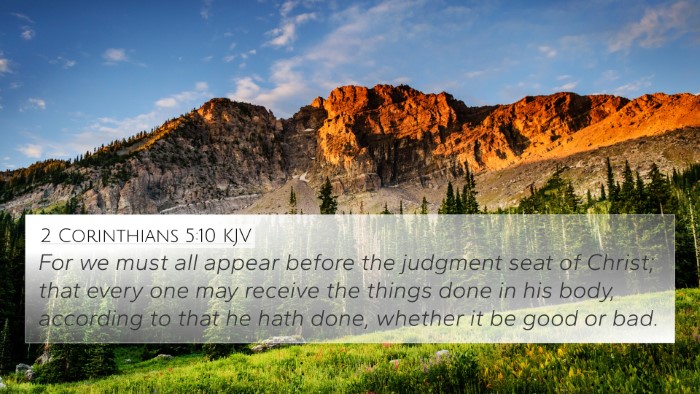
2 Corinthians 5:10 (KJV) »
For we must all appear before the judgment seat of Christ; that every one may receive the things done in his body, according to that he hath done, whether it be good or bad.
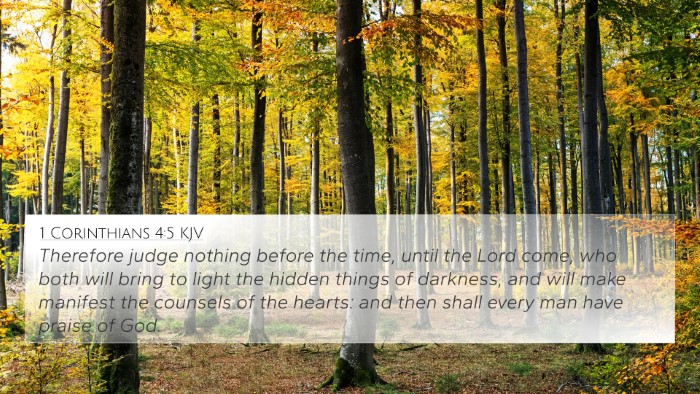
1 Corinthians 4:5 (KJV) »
Therefore judge nothing before the time, until the Lord come, who both will bring to light the hidden things of darkness, and will make manifest the counsels of the hearts: and then shall every man have praise of God.

Ecclesiastes 12:14 (KJV) »
For God shall bring every work into judgment, with every secret thing, whether it be good, or whether it be evil.
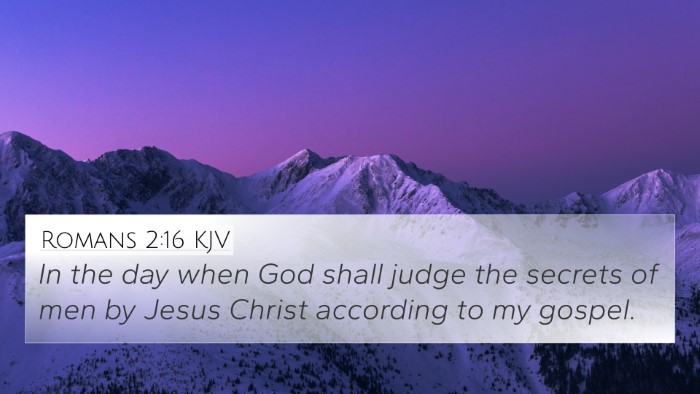
Romans 2:16 (KJV) »
In the day when God shall judge the secrets of men by Jesus Christ according to my gospel.
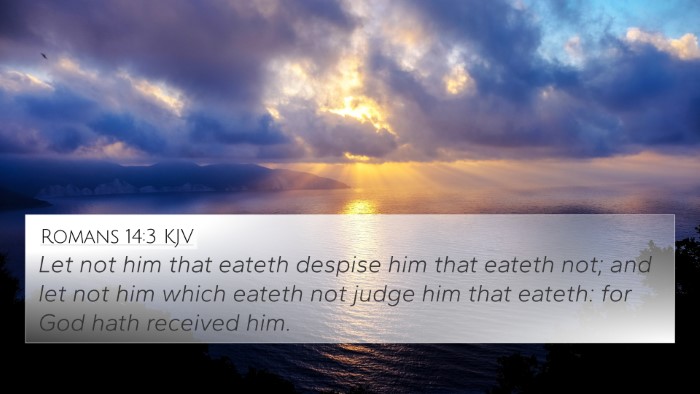
Romans 14:3 (KJV) »
Let not him that eateth despise him that eateth not; and let not him which eateth not judge him that eateth: for God hath received him.

Matthew 25:31 (KJV) »
When the Son of man shall come in his glory, and all the holy angels with him, then shall he sit upon the throne of his glory:

Jude 1:14 (KJV) »
And Enoch also, the seventh from Adam, prophesied of these, saying, Behold, the Lord cometh with ten thousands of his saints,
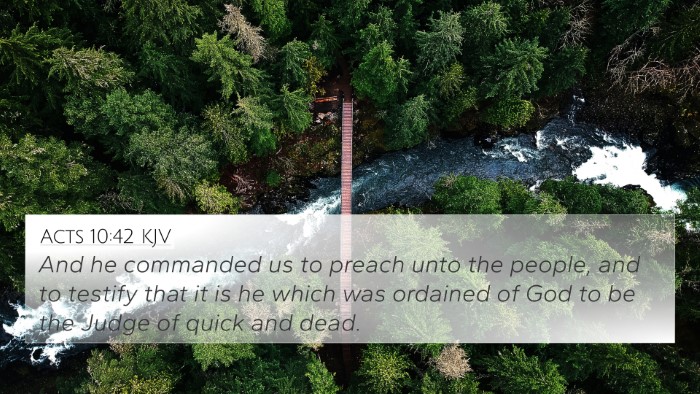
Acts 10:42 (KJV) »
And he commanded us to preach unto the people, and to testify that it is he which was ordained of God to be the Judge of quick and dead.

Revelation 20:11 (KJV) »
And I saw a great white throne, and him that sat on it, from whose face the earth and the heaven fled away; and there was found no place for them.
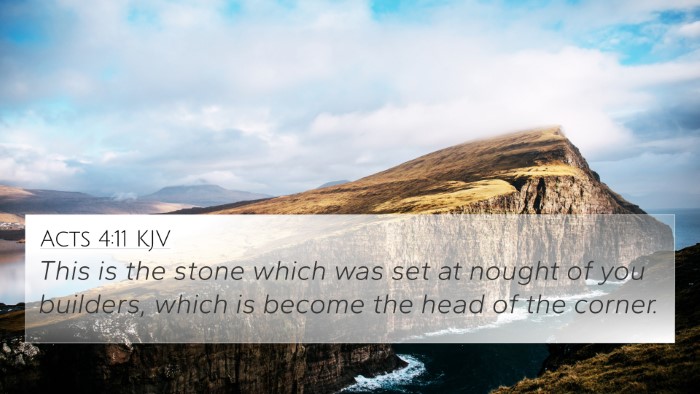
Acts 4:11 (KJV) »
This is the stone which was set at nought of you builders, which is become the head of the corner.

Luke 23:11 (KJV) »
And Herod with his men of war set him at nought, and mocked him, and arrayed him in a gorgeous robe, and sent him again to Pilate.

Acts 17:31 (KJV) »
Because he hath appointed a day, in the which he will judge the world in righteousness by that man whom he hath ordained; whereof he hath given assurance unto all men, in that he hath raised him from the dead.
Romans 14:10 Verse Analysis and Similar Verses
Understanding Romans 14:10
Romans 14:10: "But why dost thou judge thy brother? or why dost thou set at nought thy brother? for we shall all stand before the judgment seat of Christ."
The verse invites profound reflection on themes of judgment, accountability, and the communal aspects of faith. It emphasizes that God is the ultimate judge, and we should refrain from passing judgment on others.
Combined Insights from Public Domain Commentaries
Matthew Henry's Commentary
Matthew Henry emphasizes the futility of human judgment against our brethren. He underscores the necessity of humility, urging believers to focus on their own conduct rather than scrutinizing others. The ultimate accountability is to Christ, suggesting that all individuals will face divine scrutiny, making human judgment passé and inappropriate.
Albert Barnes' Commentary
Albert Barnes highlights the principle that all Christians will be brought before Christ's judgment seat. He notes that the admonition against judging others stems from the reality of this impending judgment, where each will be evaluated based on their own actions rather than on the actions of their fellow believers.
Adam Clarke's Commentary
Adam Clarke sheds light on the idea of "brother" as not merely familial but a reference to spiritual kinship. He explicates that judging others can create divisions within the body of Christ, detracting from the unity and love that ought to define Christian fellowship.
Thematic Bible Verse Connections
This passage resonates with several other scriptures that address similar themes of judgment, unity, and accountability. Below are cross-references that offer additional insight:
- Matthew 7:1-2: "Judge not, that ye be not judged. For with what judgment ye judge, ye shall be judged..."
- 2 Corinthians 5:10: "For we must all appear before the judgment seat of Christ..."
- James 4:11-12: "Speak not evil one of another, brethren..."
- 1 Corinthians 4:5: "Therefore judge nothing before the time, until the Lord come..."
- Galatians 6:1: "Brethren, if a man be overtaken in a fault, ye which are spiritual, restore such a one..."
- Romans 2:1: "Therefore thou art inexcusable, O man, whosoever thou art that judgest..."
- Philippians 2:14-15: "Do all things without murmurings and disputings..."
Inter-Biblical Dialogue
The thoughts derived from Romans 14:10 engage in laudable inter-Biblical dialogue that transcends cultural and temporal boundaries. By comparing various scriptures through cross-referencing, one can see the harmonious message which emphasizes love, unity, and personal accountability.
Practical Applications
This verse and its surrounding context should prompt believers to evaluate their attitudes towards fellow Christians. It suggests several actions:
- Focus on self-examination: Engage in regular self-reflection to ensure that one's actions are aligned with Christ's teachings.
- Promote unity: Actively work towards fostering an environment of love and cooperation within the community of believers.
- Avoid divisive behaviors: Steer clear of gossip, criticism, and judgmental attitudes that can harm the body of Christ.
Tools for Bible Cross-Referencing
To delve deeper into the connections and implications of Romans 14:10, utilizing various tools for Bible cross-referencing can be beneficial:
- Bible Concordance: A useful tool that can help locate verses related to specific themes.
- Bible Cross-Reference Guide: Helpful for finding related scriptures that shed light on particular passages.
- Cross-Reference Bible Study: A method focused on analyzing interconnected verses for deeper understanding.
Conclusion
Romans 14:10 serves as a reminder that believers are called to accountability before Christ and that human judgments often obscure the greater call to love and acceptance within the body of Christ. By engaging with the broader spectrum of scripture through cross-referencing, one can gain a richer, more profound understanding of the elegance of biblical unity and responsibility.

